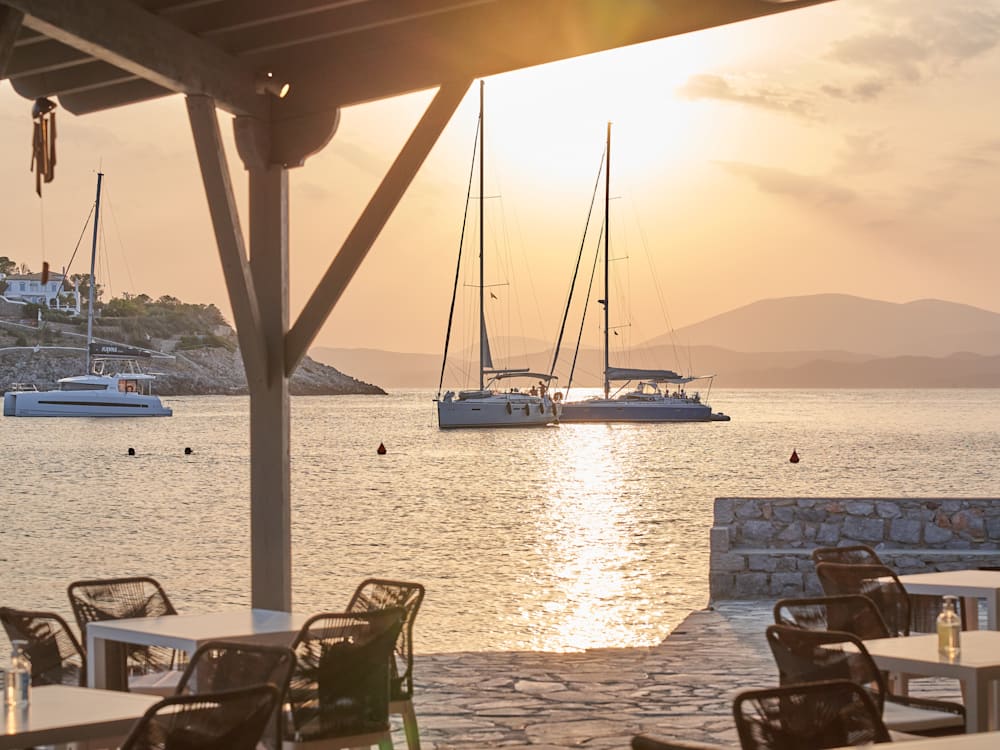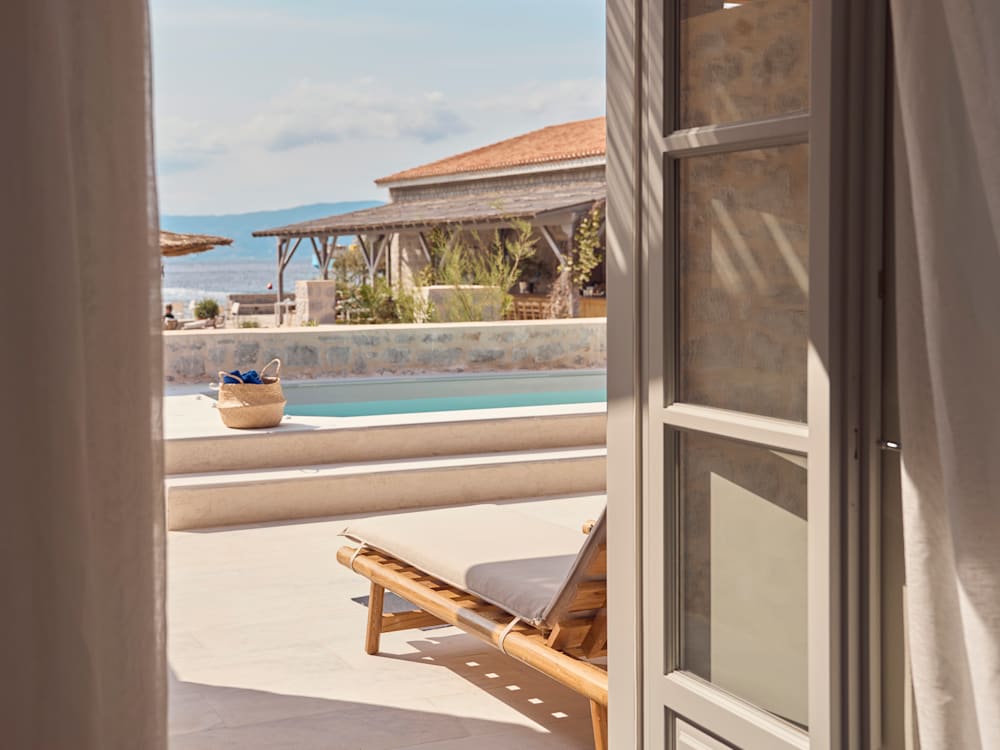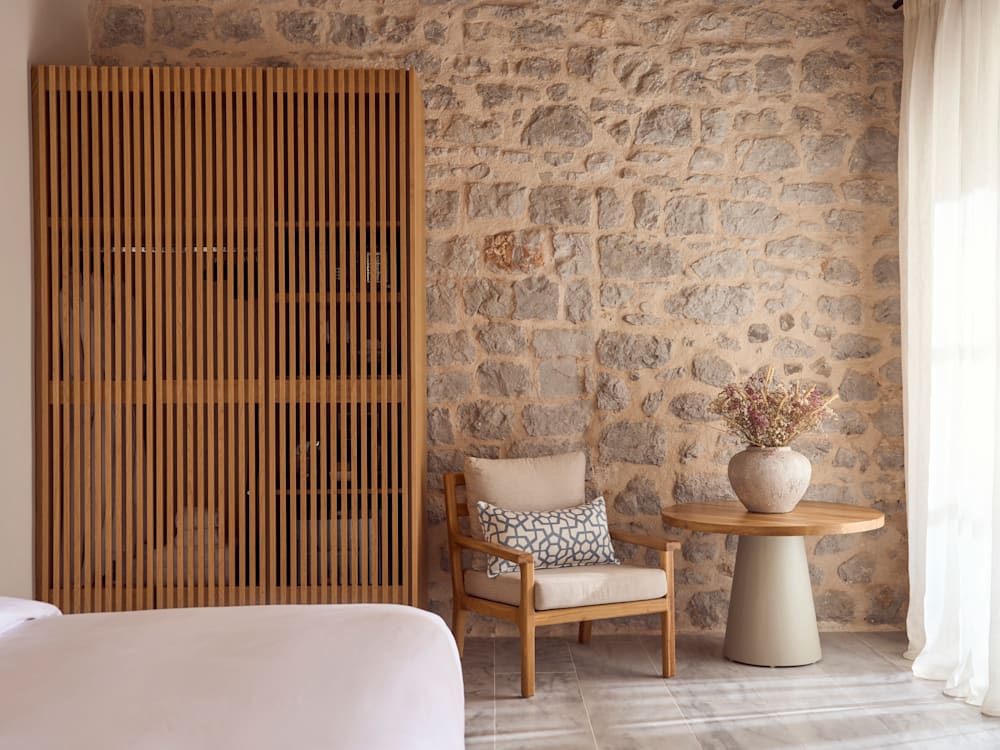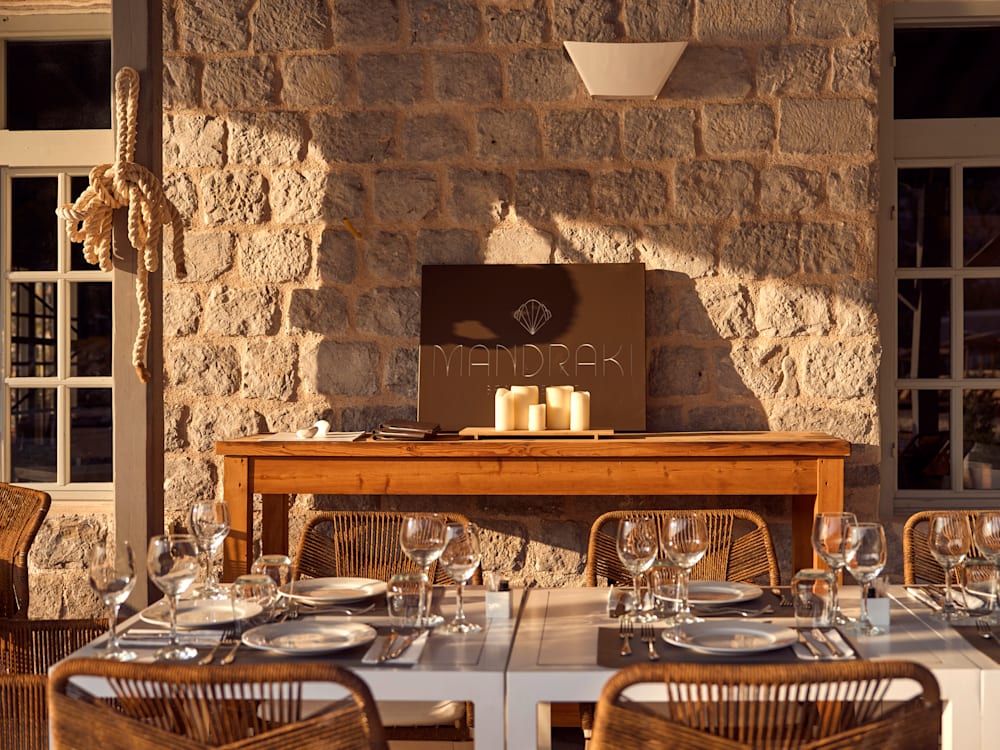Do you know what the fastest-moving creature on Earth is? Forget peregrine falcons, cheetahs, and Usain Bolt, it’s two British people, deprived of heat all summer, arriving by boat into a secluded, sun-dappled Greek cove, and changing into their swimsuits. 0–100mph in 0.2 seconds flat, Mrs Smith is almost naked, champagne in hand, and I’m not far behind her. I’ve never seen anything like it, and neither has the porter helping us with our bags. But let me rewind a little…

Firstly, welcome to Hydra, the lithe island which lies like a long dash under the Eastern Peloponnese and makes an evangelist of all visitors who pass by. It’s easy to see why: there’s its famous carless-ness (donkeys and mules step in to haul luggage up sharp inclines) and the fact Leonard Cohen made a home here. There’s its pine-scented swimming spots, its Jeff Koons curlicuing gold sun perched on a cliff edge, and its slender cats which migrate like magnets into laps. Then there’s also the fact that it’s eye-wateringly well-preserved. As our ferry swerves into the harbour, and next-door island Poros rises out of the sea like a whaleback, Hydra port seems calibrated for beauty. Houses step up in perfect strides into the hills – all Venetian balconies and Mediterranean terracotta.
Beyond the hustle and bustle of spritz bars along the main gangway, a curving, pedestrian path runs each way out of the port before abandoning the coast and heading inland. Were you to walk to Mandraki Beach Resort, it would take you and your donkey about 30 minutes – but for hotel guests, a private boat meets you in a very Casablanca-ish way at the clocktower. Navy blue gloss, with a gleaming lacquered-wood interior, it shines as it skirts us over the waves.
Hydra by name, hydra by nature: I should say that we arrived to the island in the midst of apocalyptic storms (a story for another time, though I will say, if your partner’s hair ever stands directly on end root to tip, it’s not unlikely imminent lightning is aiming at their head, and I do not recommend being where we were at the time: on a boat).

If this were in a film, it might be a touch heavy-handed, but it’s totally true: as Mandraki comes into view, the clouds finally disband into shining blue, and the sea glitters in that way beloved by perfume adverts: a riot of firefly flashes. Three members of the team step out to greet us on the stone dock, and it all feels wonderfully White Lotus, with all the decadence and none of the murder.
Perfectly to the scale of the island, Mandraki Beach Resort slips like a little beam into the bay, its terracotta roof the same colour as the winding road up the mountain behind it. Its totally transformed buildings take up the footprint – and use some of the original stone – of the 18th-century hideout of Greek revolutionary Captain Miaoulis, a storied sea captain whose forces sheltered in the cove.
But enough about the history, and more about the private pool. We’re escorted to our room through a slick bamboo gate that takes us into our own walled garden, an outdoor living room – with seating big enough to host, and a duet of deckchairs – footnoted by an emerald-cut pool, with views of the sparkling bay beyond it.

Our room is as cool and crisp and welcome as the bottle of Veuve Clicquot on ice that waits for us. Its stone walls rise sky-high into the eaves, and, made of marble, linen, pale wood and pure space, it feels like the platonic ideal of shade, the type that in any other place on Earth you’d spend hours searching for but never quite find.
And that’s when it happens, our record-speed strip for sun. I park on a lounger, and Mrs Smith, decked in red, takes the pool edge, topped with a textured marble that retains its cool even in afternoon heat. The David Hockney lines of light dancing in the water next to her make me think of kids playing jump rope, and my eyes make the same ribbons when I shut them in the sun.
It feels obscene to shut them though. How dare I? Each time I open them I have to chew an embarrassing smile out of my mouth. It’s the one-two punch of pool then bay behind it. It’s the lulling boat masts, the lapping sea; the cove’s edges that slope into the water, the bright distraction of butterflies. I top up Mrs Smith’s glass, then take another sip: all together, it’s so pure an expression of ‘holiday’ I feel almost embarrassed.

There are things to do – a little saunter into ‘town’ perhaps, past the balm and camouflage of eucalyptus trees, and walls with white tops that draw clean, beautiful lines on the island’s steep edges. But the truth is, at Mandraki, the point as we personally chose to interpret it, was to do precisely nothing.
We glide between our pool and – 18 steps away at most – the straw parasols that dress Hydra’s only sandy beach, studded with jade-green stones. We carry our books poolside, beachside, poolside, beachside, until they’ve been splashed then sun-dried so many times the pages look crimped. And, of course, we eat.
The on-site restaurant seems to extend directly into the sea: seen from a distance (a distance we like to keep minimal), the softly lit tables appear to float on water. We maraud around the menu – from a pitch-perfect cauliflower, toasted almond and lemon zest salad (a riff on a Gordon Ramsay recipe he’d always loved, the owner tells us), to scallop and shrimp orzo, which is so good I promise Mrs Smith the world if she’ll share it with me. (‘I thought you’d already promised me that,’ she replies suspiciously.)

In the toast of the afternoon, something about backlit clouds in Greece can’t help but make you think of the gods, and as the sun sets, the water in front of us and the heather-pink hills behind the hotel turn to gold. Distant hills transform into dusty silhouettes then disappear. Feeling like gods ourselves watching over all of this, we drink dessert wine in tiny glasses. Back in our room, continuing the theme, a celestial final flourish: a turn-down service has tucked our windows in for the night, and left iced water and midnight-snack-sized brownies on our bedside tables.
Getaways with Mrs Smith always feature an animal finale. On our last day, as soon as she shouts back to the beach, ‘Rosa! An octopus!’, I know she’s a goner. For the last hours of our final afternoon, Mrs Smith stays out in the cove – floating on her front, shoulders burning – so she can hover above her new friend, watching its curling limbs, its occasional spats with fish, well and truly infatuated. Since she is a proper person with a proper job, I shouldn’t say that at one point she attempted to ‘fashion a snorkel’ from a biodegradable drinking straw so she could watch it without taking breaks for breath. But that’s love, and for the saner among you, I would encourage you to bring more conventional equipment.
It’s love too – love tipping into heartbreak – when finally, the time comes for the boat to take us away again. I’ve mentioned previously that Mrs Smith and I play endless rounds of rhetorical questions. Mostly they feature methods for escaping apocalypses, but every now and then, we allow ourselves a slightly more romantic scenario. ‘If you could live in any hotel we’ve ever stayed at, which would it be?’ she asks me. As fast as our changing into swimsuits: Mandraki, we agree. Mrs Smith just hopes her octopus pal will still be there on our return.
Having spent her childhood holidays in the bright lights of Norfolk youth hostels, Rosa Rankin-Gee set off for most exotic bunkbeds as soon as she had the vote. She’s spent over 270 hours on buses travelling from Los Angeles to Buenos Aires, and after a stint in Andalucía, lived in Paris, which she then swapped for a life spent shuttling between Ramsgate and South London. Her first novel The Last Kings Of Sark won Shakespeare and Company’s Paris Literary Prize, and her second Dreamland offers a darker vision of seaside town Margate.

